Book contents
- Empowering Labor
- Empowering Labor
- Copyright page
- Dedication
- Epigraph
- Contents
- Figures
- Tables
- Acknowledgments
- Abbreviations
- Introduction
- 1 Use of Wage Policy for Pre-distribution
- 2 Elite Strategies toward Labor, Left Unity, and Wage Policy
- 3 The Modeling of Elite Strategies toward Labor
- 4 The Unity of the Left and Adaptation of Elite Strategies
- 5 The Usage of Wage Policy for Pre-distribution
- Conclusions
- Envoi
- Appendix Documentary Sources and Interviews
- References
- Index
- References
References
Published online by Cambridge University Press: 14 March 2024
- Empowering Labor
- Empowering Labor
- Copyright page
- Dedication
- Epigraph
- Contents
- Figures
- Tables
- Acknowledgments
- Abbreviations
- Introduction
- 1 Use of Wage Policy for Pre-distribution
- 2 Elite Strategies toward Labor, Left Unity, and Wage Policy
- 3 The Modeling of Elite Strategies toward Labor
- 4 The Unity of the Left and Adaptation of Elite Strategies
- 5 The Usage of Wage Policy for Pre-distribution
- Conclusions
- Envoi
- Appendix Documentary Sources and Interviews
- References
- Index
- References
Summary

- Type
- Chapter
- Information
- Empowering LaborLeftist Approaches to Wage Policy in Unequal Democracies, pp. 187 - 210Publisher: Cambridge University PressPrint publication year: 2024



